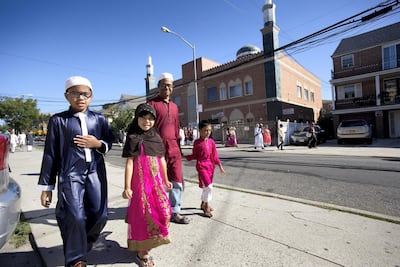With its red and white emergency lights, blue stripes and shield, the Ford Taurus resembles a police squad car.
It is not until passers-by stop for a better look that they see its bold lettering spells out “Muslim Community Patrol”, a new effort to bring security to the streets of Brooklyn.
The patrols, due to begin in a few weeks, are just the most visible part of a programme that will include translation and counselling, mentorship and other services, says Noor Rabah, 31, the vice president of Muslim Community Patrol and Services, who lives near by.
The group has trained 60 volunteers with the help of local police. Two cars are equipped and ready. Another eight vehicles are expected within a year.
It all comes at a time of heightened anxiety for American Muslims and fears of a growing tide of hate crime.
“It is a not just a response to that,” Mr Rabah says after a fund-raising banquet. “Rather it is a dream of many Muslims for decades. We have always tried to have our own community patrol because it gives a sense of unity, a sense of better understanding, a better liaison between us and the NYPD.
“But there are certain cases where we feel if we had been around we could have served as a preventive service.”
He is talking about the 2016 murder of an imam and his assistant after afternoon prayers in the Queens borough.
Oscar Morel was sentenced to life in prison for the killing, but no motive was ever identified.
Along with President Donald Trump’s travel ban and an increase in anti-Muslim groups reported by the Southern Poverty Law Centre, this is a time of fear for some minorities.
Volunteers plan to station themselves close to Islamic schools in Brooklyn, keeping an eye on pupils as they come and go, and patrol near mosques and bus stops in neighbourhoods such as Bay Ridge, which is known for its large Syrian population.
They hope to act as a deterrent. Rather than intervening directly, they can alert police to suspicious activity.
In so doing, they can work for everyone in the community regardless of ethnic or religious background, Mr Rabah says.
Yet that has not stopped an angry backlash among people who claim the programme has ulterior motives.
Laura Loomer, a hardline conservative provocateur who is banned from using Twitter, claimed the street patrols had another purpose.
“The job of the people driving the cars is to enforce Sharia law,” Ms Loomer says on Instagram. “In case you never thought Sharia would be in America, well, it’s here.”
Videos have sprung up on YouTube with commentators condemning the plans.
But the new service is simply the latest example of a community-based patrol. It joins the Brooklyn Asian Safety Patrol, founded in 2014, and the Shomrim, a long-standing Jewish organisation that has a presence in mainly Hasidic areas of Brooklyn.
The Muslim patrols have the backing of senior police and political leaders in the borough, who attended the group’s fund-raising dinner.

Mr Rabah says the patrol service would not have won these endorsements if it were a Sharia patrol.
“The reality is that we are not doing such a thing,” he says. “We are not trying to force anything on anyone.”
Also attending the fund-raiser was Amirudin Rahim, who arrived in New York from Guyana in 1979 and says it is an important step forward.
“It’s a chance to show that we are part of the community and are just like everyone else when there is a crime in the community,” Mr Rahim says.

